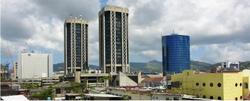Linda Jafar-Hutchinson, Business Writer

Trinidad's capital Port-of-Spain, the seat of goverment, is being repositioned as a centre for international finance. - File
Port-of-Spain has announced initial agreements in principle to kickstart its offshore centre business, but sees the greatest opportunity in the Middle East where US$1 trillion is at play.
Minister of Finance, Karen Nunez Tesheira, who has been leading the process said Trinidad and the Dubai International Financial Center (DIFC), have already formalised a partnership.
"They have reviewed other potential IFCs in the Caribbean and Latin America and decided that we have the best value proposition in the region," said Nunez Tesheira.
"They have agreed to provide us with the road map and necessary technical assistance to ensure success."
They also believe the TTIFC is the gateway by which they can transact business with Latin and South America."
The finance minister said that Dubai has indicated that there is potentially US$1 trillion available in the Middle East for investment in the region.
Serious emerging player
But, Port-of-Spain also expects its pact with Dubai to leverage the oil and gas economy as a serious emerging player in international finance.
"We believe that this relationship will attract many of the world's largest and best-known financial institutions, " said Nunez Tesheira.
The finance minister also announced that Royal Bank of Canada (RBC), which recently locked up one of the biggest acquisitions in Caribbean history, has already committed to taking space in one of the Trinidad and Tobago International Financial Centre (TTIFC) towers under construction in downtown Port-of-Spain to accommodate its offshore business.
One tower is 90 per cent complete, and the other 60 per cent.
The TTIFC has also got expression of interest from Lehman Brothers to be an anchor tenant, and from Merrill Lynch, SEAF, Gravitas and others, for office space in the towers.
Describing the TTIFC concept as having some unique features not common to most other, the finance minister said Port of Spain intends to combine a commodity trade facility with the financial services and establish a Special Purpose Economic Zone (SPEZ).
Nunez Tesheira was careful to make the distinction between the planned SPEZ and a Special Economic Zone (SEZ), saying the former allows additional flexibility as it was not tied to a location but defined by its operational criteria.
Outlining the government's next step for the TTIFC, Nunez Tesheira said the policy framework on legislation/regulatory/tax and draft organisational structure of the TTIFC will be completed by the end of August.
Education collaboration
The government had earlier announced that the TTIFC earnings would be used to invest in educational and other services throughout the economy.
Education collaboration has already begun, with an understanding between the Ministry of Finance and Ministry of Science, Tertiary Education and Technology and University of the West Indies that skills training to support the IFC would be accelerated.
The draft lease terms for TTIFC businesses is to be completed by the end of September.
Indeed, Trinidad has decided to step up the pace of implementation of the TTIFC, now set for the first quarter of 2009.
Nunez Tesheira said a number of factors "are telling us to go ahead."
"The bearish global stock markets have generated a latent demand for good investment projects. As the world adjusts to record-setting prices for oil, our positioning as the fifth largest exporter of LNG takes on a new significance," she said.
"Our existing prominence as a global energy player is of special interest to our potential partners in the Middle East. The country's overall economic growth continues to defy international trends."
Foreign investment
Trinidad's economy has been growing at an average of 8.3 per cent since 2001.
Over the last six years, foreign investment flows have topped US$6 billion, and unemployment is at a 4.5 per cent low.
"The convergence of all these positive factors has opened a window of opportunity for us," the minister said.
Nunez Tesheira adds that the establishment of the TTIFC would boost the credibility and reputation of the entire financial sector, but there is also expectation that it will open the door for skills transfer between the international financial institutions that set up offices in Port-of-Spain and local financial houses.
The finance minister said that the experience of other offshore jurisdictions show that IFCs create additional jobs, both in the financial and the hospitality industry, and improved quality of services in the local economy, including medical and educational institutions.
business@gleanerjm.com

